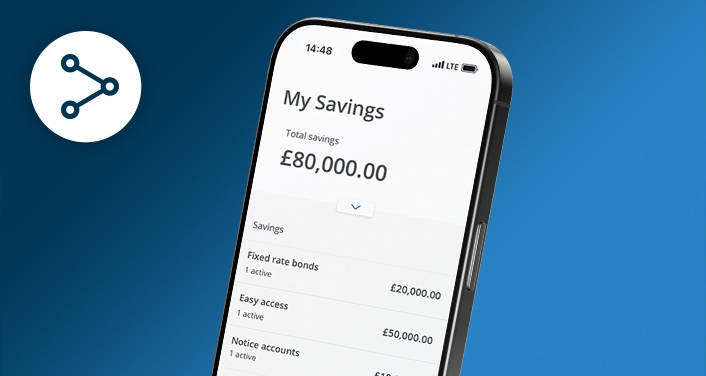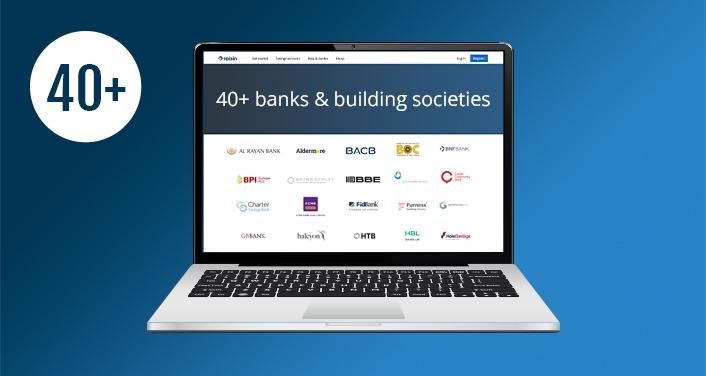More than 1 million savers worldwide
How will US tariffs and economic instability impact UK savers?
A number of unprecedented events have affected global economic stability over the past decade: the COVID-19 pandemic, numerous conflicts and, more recently, the global tariffs introduced on goods imported to America.
These events led to volatility on the stock and asset markets, causing wider economy uncertainty and potentially influencing areas like inflation and interest rates. Many of these events are hard to predict or control, which may affect the behaviour of investors and savers.
On this page, we’ll look at how recent global shifts have shaped the UK economy, what experts say about potential interest rate trends, and how savings accounts might help you manage your money during uncertain times.
Key takeaways
Unprecedented global events, such as the US’ global tariff on imports, can
The imposition of a 10% tariff on will ‘clearly’ have an impact on the UK economy, according to Prime Minister Sir Keir Starmer.
Savings accounts, like those offered on Raisin UK, may help protect money from short-term market swings.
The information provided here is for informational and educational purposes only and does not constitute financial advice. Please consult with a licensed financial adviser or professional before making any financial decisions. Your financial situation is unique, and the information provided may not be suitable for your specific circumstances. We are not liable for any financial decisions or actions you take based on this information.
How will the US tariffs and economic instability affect the UK?
The US initially placed a 10% tariff on all UK imports, in addition to a 25% tariff on automobiles and steel (although this was later renegotiated to a 10% tariff on cars up to 100,000 exports and no tariffs on steel, with some caveats). President Donald Trump has implemented numerous changes to the tariffs since then, although the UK is still subject to the initial 10% tariff. Speaking before the pause, UK Prime Minister Sir Keir Starmer stated the tariffs will ‘clearly’ have an impact on the UK economy. This sentiment is reflected in the IMF's 2025 growth forecast for the UK, which was cut by a third to just 1.1% in the wake of the tariffs and ensuing negotiations.
Stocks and shares experiencing steep declines and high volatility
Global stock markets experienced a sharp decline shortly after the imposition of the US tariffs, with investors selling their assets in anticipation of economic uncertainty and poorer performance from companies across the world. In the UK, the FTSE 100 experienced its worst day since the start of the COVID-19 pandemic with a 4.95% drop.
As a result, many investors in the UK - including those holding shares through their pension funds - saw the value of their portfolios drop.
The subsequent US tariff pause saw the FTSE 100 rise by 4.2% in the early hours of trading on 10 April, demonstrating the impact of global events on asset prices. The temporary nature of the pause, which may be a reprieve rather than a full cancellation of tariffs, suggests more volatility is on the way.
Interest rates dropped in May and August
Before the tariffs, economists forecast between two and four base rate cuts this year. The first occurred in February, with a second 0.25% cut in May. A third base rate cut, to 4%, was made in August.
It’s unclear how the developing tariff situation will impact the Bank of England Monetary Policy Committee’s decision-making. Before the tariff pause and the cut in May, Charlie Bean, the former deputy governor of the Bank of England, stated that the MPC should cut rates by 0.5% to 4% in response to economic uncertainty. There was some division on how steep May's base rate cut should be too, with five members voting for a 0.25% cut, two voting for 0.5% cut and two voting to hold the rate. There was an even closer vote for the third base rate cut in August, with five voting for and four against. It's important to note, however, that the tariffs aren't the only factor behind the MPC's decision to cut the base rate. You can learn more about how the base rate works, and how it can affect savings accounts rates, here.
Compare top savings accounts
How can a savings account help during economic uncertainty?
Savings accounts can offer a steadier alternative to more volatile assets like stocks. While your savings are typically at little risk of losing value, inflation can still reduce their purchasing power over time.
The forecasted change in interest rates may impact the interest rate offered by banks, however, which in turn may affect which products UK savers deposit their money into.
Fixed rate bonds lock in higher interest rates
Given the anticipated cuts to the Bank of England’s base rate, and the possibility of increasing inflation, fixed rate bonds can help savers ‘lock in’ higher interest rates.
Compare fixed rate bonds
Notice accounts offer higher interest and more flexibility
Notice accounts offer higher interest rates than easy access savings accounts but more flexibility than a fixed rate bond. They may be useful during times of economic uncertainty, helping secure higher interest payments while providing the flexibility to withdraw your money (after a set notice period).
Compare notice accounts
Easy access savings accounts: A flexible way to save for everyday needs or unexpected costs
Savings kept in an easy access savings account could be affected by falling interest rates, but they do offer stability vs. holding shares and flexibility vs. fixed rate and notice account products.
Easy access savings accounts can be particularly useful for storing an emergency fund, allowing you to earn interest while having the option to instantly withdraw for unplanned expenses.
Compare easy access accounts
Why should you save with Raisin UK?

All your savings in one account
Manage your money across easy access savings, fixed rate bonds and notice accounts with a single log-in.

Free and easy to set up
Open your free Raisin UK account and apply once for access to our entire range of accounts.

A diverse range of providers
Why stick to the high street? Grow your money with accounts from over 40 banks and building societies.

FSCS (or equivalent) protection
All banks and building societies on our platform offer FSCS (or European equivalent) protection.
How else could US tariffs impact the UK?
Potential increases to prices and inflation
The US is the UK’s largest export partner, with £60.4bn of goods exported to the US in 2023.
As a result, UK companies may experience reduced demand from the US as well as higher operating costs and tighter margins if tariffs are maintained. This may lead to higher costs for consumers in the UK and US as companies account for the changing landscape.
According to Clarissa Hahn, economist at Oxford Economics, fluctuating exchange rates could also lead to increased import costs, with these costs potentially passed onto UK consumers.
Prices may increase further if the government decides to respond with further tariffs on US goods coming into the UK, with £57.9bn imported in 2023. This may lead to increased inflation, although this depends on whether importers choose to source products from countries with lower or no tariffs instead.
Saving money in a sustainable and less risky manner, as well as having an emergency fund, can help protect from the impact of economic uncertainty.
Saving made simple with Raisin UK
Raisin UK offers competitive rates on savings products from over 40 partner banks and building societies, including fixed rate bonds, notice accounts and easy access savings accounts. Simply create your free account and fill out a single application to compare accounts and grow your money with our partner banks.
Create your free account
What customers say about Raisin UK
A huge fan of Raisin
Used their service since they started in the UK and couldn't rave more about the variety of savings accounts, the rates and their service.
Trustpilot | 10th July 2025
Lots of choice when it comes to savings…
Lots of choice when it comes to savings in one app whether it's easy access/fixed rate bonds or notice accounts - easy with competitive interest rates.
Trustpilot | 5th July 2025
Easy to save in different types of accounts
I am able to move money from one account to another, and open accounts with a few keystrokes. This is all because Raisin checks my credentials once then allows me to save with them.
Trustpilot | 5th July 2025